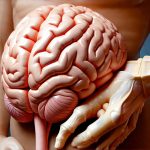The intricate relationship between our gut microbiome – the vast community of microorganisms residing in our digestive tract – and brain function has emerged as one of the most fascinating areas of modern scientific inquiry. For decades, the brain was considered largely isolated, a command center operating independently from the rest of the body. However, we now understand this is far from true. A constant, bidirectional communication network exists between the gut and the brain, often referred to as the “gut-brain axis,” profoundly influencing our mood, cognition, and even susceptibility to neurological disorders. This isn’t merely a one-way street; what happens in your gut directly impacts your brain, and conversely, your mental state can significantly affect your digestive health.
This interconnectedness stems from several pathways, including the vagus nerve (a major cranial nerve acting as a direct line of communication), the immune system, the endocrine system (hormone regulation), and crucially, the production of neurochemicals – the very substances that regulate brain function. The gut microbiome plays a surprising and pivotal role in synthesizing many of these essential chemicals, challenging our traditional understanding of where these vital compounds originate. This article will delve into the specifics of this relationship, exploring how gut flora influences brain chemical production and the implications for overall well-being.
The Gut Microbiome & Neurotransmitter Synthesis
Neurotransmitters are the chemical messengers that allow neurons to communicate with each other, driving everything from our emotions and thoughts to basic bodily functions. For a long time, it was assumed these were solely produced within the brain itself. However, research reveals that a significant portion of neurotransmitters—or their precursors—are actually manufactured in the gut, largely by our microbial inhabitants. This is particularly true for key players like serotonin, dopamine, and GABA (gamma-aminobutyric acid).
Serotonin, often dubbed the “happiness hormone,” plays a crucial role in mood regulation, sleep, and appetite. Approximately 90% of the body’s serotonin isn’t produced by the brain but by enterochromaffin cells in the gut, stimulated by signals from the microbiome. Specific bacterial species can directly influence serotonin production and release. Similarly, dopamine, associated with reward, motivation, and motor control, has a significant microbial component to its synthesis pathway. While dopamine itself doesn’t readily cross the blood-brain barrier, its precursors – like L-DOPA – are influenced by gut bacteria, impacting brain dopamine levels indirectly.
GABA is an inhibitory neurotransmitter that helps calm the nervous system and reduce anxiety. Certain bacterial strains, such as Bifidobacterium and Lactobacillus, have been shown to directly produce GABA within the gut lumen. This locally produced GABA can then influence vagal nerve signaling, impacting brain activity and potentially reducing stress responses. The diversity of your gut microbiome – meaning how many different types of bacteria are present – is a key factor in determining neurotransmitter production capacity. A diverse microbiome generally leads to more robust and balanced neurochemical synthesis. Understanding the connection between [liver]https://vitagastro.com/understanding-the-connection-between-liver-and-hormones/ can also impact this process.
Microbial Influence on the Vagus Nerve
The vagus nerve serves as a direct physical link between the gut and the brain, enabling rapid two-way communication. It’s often described as the “information superhighway” connecting these two critical systems. The gut microbiome doesn’t just influence the vagus nerve; it actively modulates its activity.
- Microbial metabolites (byproducts of bacterial metabolism) directly stimulate vagal afferent fibers – sensory neurons that send information from the gut to the brain.
- Specific bacterial species can influence the sensitivity and responsiveness of these fibers, altering how signals are transmitted.
- The microbiome also affects the production of short-chain fatty acids (SCFAs), like butyrate, propionate, and acetate, which have been shown to modulate vagal nerve activity and reduce inflammation.
This modulation impacts a wide range of brain functions. For example, increased vagal tone – meaning stronger signaling along the vagus nerve – is associated with reduced anxiety, improved mood, and better stress resilience. Conversely, disruptions in gut microbial composition can lead to decreased vagal tone, potentially contributing to mental health challenges. The vagus nerve isn’t simply a passive receiver of signals from the gut; it actively participates in feedback loops that regulate both digestive function and brain activity, creating a dynamic interplay between these two systems. A healthy [gut biofilm]https://vitagastro.com/the-connection-between-gut-biofilm-and-gas-retention/ is also important here.
The Role of Short-Chain Fatty Acids (SCFAs)
Short-chain fatty acids are metabolic byproducts produced when gut bacteria ferment dietary fiber. They’re not just waste products; they’re potent signaling molecules with far-reaching effects throughout the body, including the brain. SCFAs like butyrate, propionate, and acetate are absorbed into the bloodstream and travel to various tissues, influencing immune function, energy metabolism, and crucially, brain health.
Butyrate, in particular, has garnered significant attention for its neuroprotective properties. It’s a primary energy source for colonocytes (cells lining the colon) but also crosses the blood-brain barrier, where it can reduce inflammation, enhance neuronal plasticity – the brain’s ability to adapt and learn – and even promote neurogenesis (the formation of new neurons). SCFAs influence microglia, immune cells in the brain that play a role in synaptic pruning and overall brain health. A healthy microbiome, rich in fiber-fermenting bacteria, is essential for maximizing SCFA production. Understanding [liver health]https://vitagastro.com/understanding-the-connection-between-liver-health-and-immunity/ is also vital for SCFA production.
SCFAs also impact the gut barrier integrity. A compromised gut barrier – often referred to as “leaky gut” – allows harmful substances to enter the bloodstream, triggering inflammation that can reach the brain. SCFAs help strengthen the gut barrier, reducing permeability and minimizing systemic inflammation. This highlights the interconnectedness of gut health, SCFA production, and brain function. The connection between [overtraining]https://vitagastro.com/the-connection-between-overtraining-and-gut-inflammation/ can also impact this.
Diet’s Impact on Gut Flora & Brain Chemicals
What we eat directly shapes our gut microbiome composition, which in turn influences neurotransmitter synthesis and SCFA production. A diet lacking in fiber and rich in processed foods, sugar, and unhealthy fats can lead to a less diverse microbiome, reduced SCFA production, and impaired neurochemical balance.
- Fiber-rich foods (fruits, vegetables, whole grains, legumes) provide the fuel for beneficial bacteria to thrive and produce SCFAs.
- Fermented foods (yogurt, kefir, sauerkraut, kimchi) introduce probiotic bacteria directly into the gut, potentially enhancing microbial diversity.
- Polyphenol-rich foods (berries, dark chocolate, green tea) contain compounds that support the growth of beneficial bacteria and have antioxidant properties, reducing inflammation.
Conversely:
– Processed foods & sugar can promote the growth of harmful bacteria and disrupt microbial balance.
– Artificial sweeteners may negatively impact gut flora composition.
– High-fat diets can increase intestinal permeability (“leaky gut”) and inflammation.
Adopting a dietary pattern that prioritizes whole, unprocessed foods is one of the most powerful things you can do to support both your gut microbiome and brain health. It’s not about restrictive dieting; it’s about nourishing your body with the nutrients it needs to flourish – both physically and mentally. [Acid reflux]https://vitagastro.com/understanding-the-connection-between-acid-reflux-and-nausea/ can also impact gut flora.
It’s important to remember that the gut-brain axis is a complex system, and individual responses to dietary changes can vary. Factors like genetics, stress levels, and medication use also play a role. However, prioritizing gut health through mindful nutrition remains a cornerstone of overall well-being. [Pancreas]https://vitagastro.com/understanding-the-connection-between-pancreas-and-liver/ function plays a role too.


















